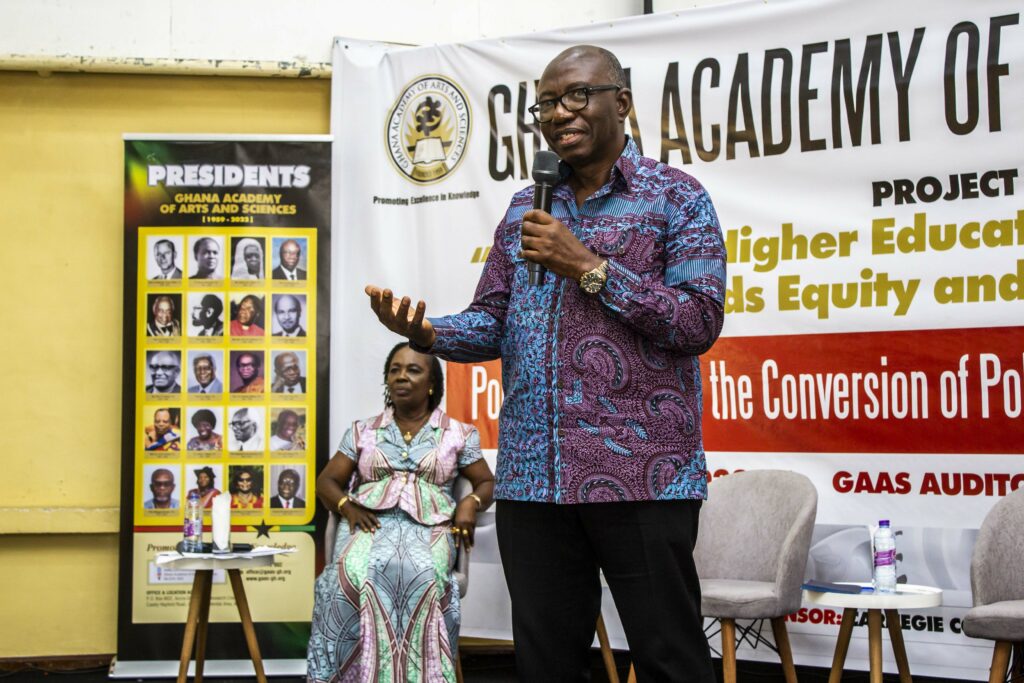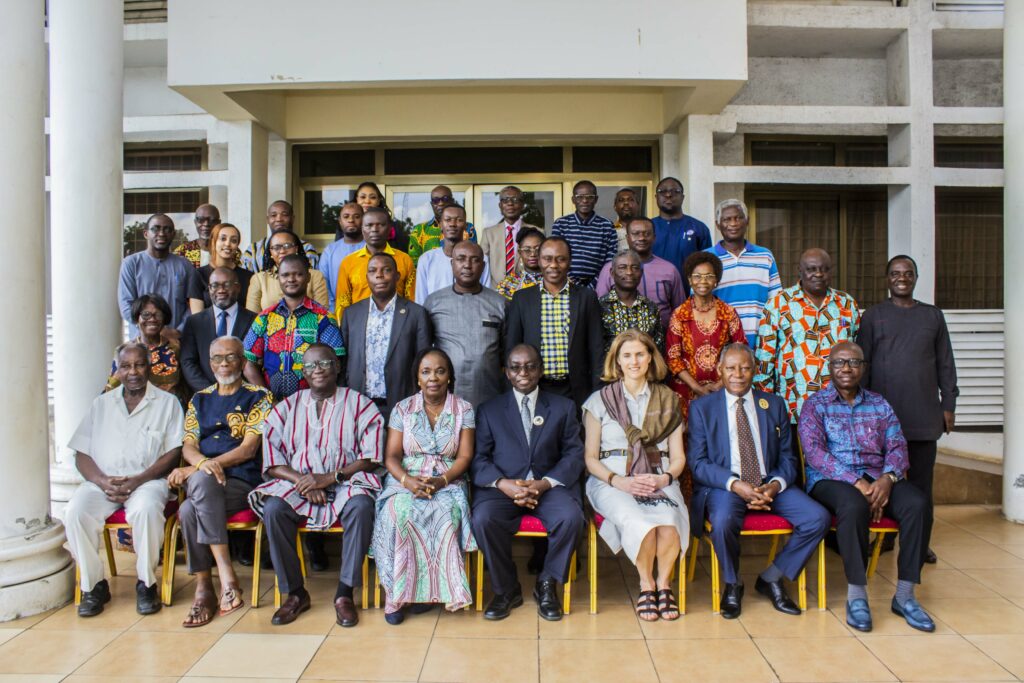Ghana Academy looks into conversion of Polytechnics into Technical Universities – The journey so far

At one time, Ghana had polytechnics. Established to train the middle-level management required to meet the human resource needs of the country to drive the economy. Then it was decided that the polytechnics should be converted into technical universities to make them focus on training Ghanaians to acquire the necessary skills with concentration.
The Ghana Academy of Arts and Sciences, yesterday March 28, 2023, held a policy dialogue to reflect over the journey so far, look at the challenges, achievements, and failures and to figure out the way forward to make the technical universities impactful in attaining the objectives of producing the human resources to spearhead Ghana’s quest for industrialization.
The technical universities have had a long and bumpy history, evolving from one form to another. They started as technical institutes, became polytechnics and were later converted into technical universities.
Before Ghana had polytechnics, the institutions were known as technical institutes. There was one in Accra, Takoradi and Kumasi. In 1963, these were re-designated as polytechnics.
Following that, the ones in Ho and Tamale were similarly elevated to sub-tertiary polytechnics under the Ghana Education Service (GES) in the mid-1980s, and the Sunyani and Koforidua polytechnics came on stream in 1987.
Cape Coast, Wa and Bolgatanga polytechnics were established as tertiary level institutions under PNDCL 321 of 1992.
Under PNDCL 321, all the 10 polytechnics located in the 10 regions of the country at that time became tertiary institutions mandated to offer Higher National Diploma (HND) programmes. Now Ghana has 16 regions.
The dialogue was held under the Academy’s project: ‘Motivating Higher Education Reforms in Ghana – Towards Equity and sustainability.’
Presenting the background paper of the ‘Policy Dialogue on the Conversion of Polytechnics to Technical Universities’, Dr George Afeti, a TVET Expert and Consultant who provided a critical assessment of the conversion of the polytechnics in Ghana to university status, noted that the development of the polytechnics as tertiary institutions has been based on a strategy of elevation or re-designation of technical institutes or by simple government pronouncement.
He added that the polytechnics were established as technical universities by an Act of Parliament, The Technical Universities Act 2016, Act 922.
Dr Afeti also pointed out that there were no eligibility criteria for the change in status of the institutions. He recalled that the conversion idea was first articulated by the President in his State of the Nation Address to Parliament in 2013, following which a Technical Committee was appointed to develop the conversion roadmap and eligibility criteria.
“There were no eligibility criteria for the change in status or qualifying benchmarks for elevation to tertiary polytechnic status; no mentoring,” he said.
He stated that the Government White Paper on the Reforms to the Tertiary Education System attempted to equate the polytechnic HND qualifications to traditional university first degrees.
Citing the White Paper, he said; “…. programmes and courses (in the polytechnics) are to be offered at the higher middle level of technician training leading to the award of higher diplomas equivalent to first degree level but not departing from syllabi dedicated to practical technician training” [Government White Paper, 1986].
He indicated further that in an attempt to clarify this controversial clause, the Ministry of Education issued a statement that the “HND is next to a degree”.
“The mishandling of the elevation of polytechnics to tertiary status led to the wave of student and staff demonstrations that rocked the polytechnic system in the early years after the upgrading in 1992: recognition of the HND; academic progression of HND graduates, etc.,” he said.
Dr Afeti laid out the step-by-step processes and decisions that among others have brought the technical universities thus far.
 He further gave the definition of a technical university as established in Ghana. “A technical university in the Ghanaian context is akin to the universities of applied sciences in countries such as Germany and The Netherlands. The technical universities in Ghana have a different focus and mandate from the traditional comprehensive universities,” he said.
He further gave the definition of a technical university as established in Ghana. “A technical university in the Ghanaian context is akin to the universities of applied sciences in countries such as Germany and The Netherlands. The technical universities in Ghana have a different focus and mandate from the traditional comprehensive universities,” he said.
He stated the following as the rationale and justification for converting the polytechnics to technical universities, as proposed by the Technical Committee that developed the conversion roadmap and subsequently endorsed by Government: a. repositioning the polytechnics as strategic institutions for the training of highly-skilled human resource to drive economic growth; b. achieving parity of esteem with the universities without departing from the practice-oriented philosophy of polytechnic education and training; c. creation of progression pathways at the tertiary level for practically-inclined SHS students and technical school graduates; d. enhancing the image of the converted polytechnics and the attractiveness of technical and vocational education and training in general.
Among other things, he said the idea was to reposition the polytechnics as strategic institutions for the training of a highly skilled workforce to drive industrialisation and economic growth, and achieve parity of esteem with the universities but with different mandate, adding that the technical universities were meant to create a logical progression pathways at the tertiary level for TVET students and HND graduates, as well as enhance the image and attractiveness of TVET.
During exchanges at the dialogue some issues were raised regarding the industry experience of most of the lecturers at the technical universities, including the fact that there is no data on where graduates of the institutions are going and what they are doing.
In his review of the background paper, Prof James Ephraim said the ultimate objective of the technical universities was to produce technical oriented graduates for industry, but there is lack funds to finance their programmes.
In his review comments, Prof Edward Akaho noted concerns over the shift of interest of the technical universities and asked if they are running programmes to meet the Sustainable Development Goals.
He said they must strategise to reform training to match the needs of industry, urging the technical universities to share knowledge, capabilities and form networks.
He called on the technical universities to form centres of excellence and they should be known for something specific.
It is obvious the technical universities could revolutionise the country’s aims to industrialise, but they require the right kind of funding, focus, leadership and training to achieve that.
By Emmanuel K Dogbevi
Copyright ©2023 by NewsBridge Africa
All rights reserved. This article or any portion thereof may not be reproduced or used in any manner whatsoever without the express written permission of the publisher except for the use of brief quotations in reviews.
